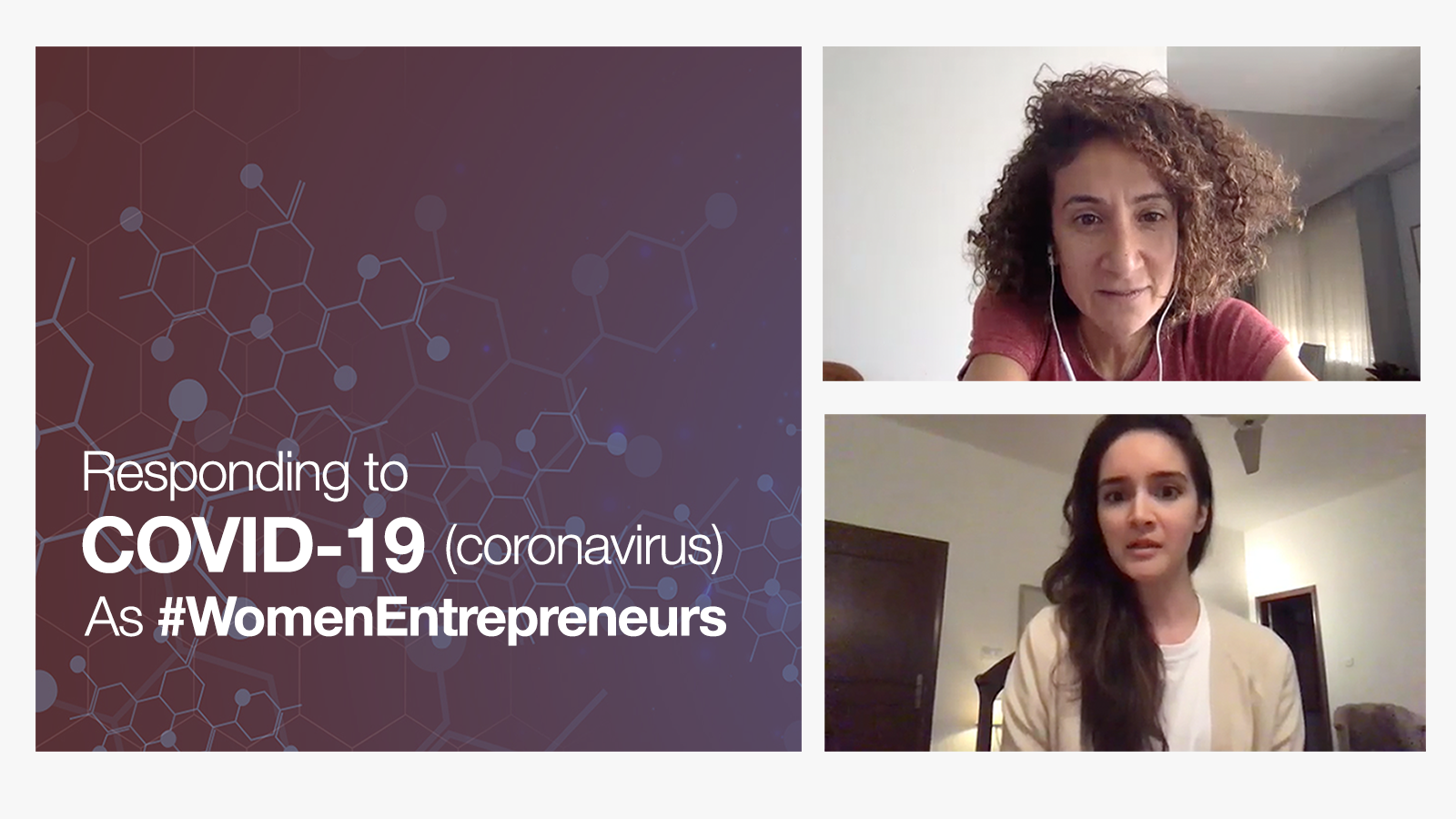As the global economy faces a major crisis, businesses across the spectrum, from large companies to SMEs, are confronted with unprecedented challenges due to the coronavirus pandemic. How are women entrepreneurs, the focus of our program, addressing this enormous challenge? We reached out to our We-Fi network and spoke with women in business who are braving the storm in their own way. While many are undergoing a stressful time, we begin the series with entrepreneurs who are leveraging the crisis as an opportunity to grow.
KARACHI: Lina Ahmed, Dot & Line: ‘Blessed to be able to provide classes online’ in times of great uncertainty
As they were expecting strict lock-down rules in their home town of Karachi, Lina Ahmed and Maheen Adamjee moved swiftly to a fully virtual office setup weeks before the actual order was issued. Now, the two female founders of the fast-growing education startup Dot & Line, are working diligently to shift to a completely online business offering. “We rapidly shifted our way of disseminating information to students through learning centers with home-based teachers to online classes. We were planning to do this anyhow, but we accelerated the launch to mid-March against a subsidized rate. It was the best time as many parents are confined to their homes and are looking for ways to keep their children engaged,” says Ahmed. It also meant that the company had to train their 200 female home-based teachers to become skilled online teachers and presenters in a very short time. Lina Ahmed: “No easy feat in Pakistan, where technology can be challenging. But our teacher partners have picked it up well and see this as an opportunity to flourish.”
While revenues from their physical learning centers have slowed down, signups for online classes by existing and new students have soared. “We were expecting high growth from those centers, so that transition to online learning needed to be made to keep children learning and for us to continue to grow. However, we aren’t looking at online learning as a short-term solution, but rather as a long-term strategy. We were getting ready for a next round of investments; that has been delayed right now as there is so much economic uncertainty and possible new investors want to see how this goes.”
While a national stimulus package for small companies in her country remains uncertain, Ahmed says that grants would be tremendously helpful ‘to provide some breathing space while costs are still ongoing’. Amidst all uncertainty, the startup co-founder still finds very valuable life lessons: “In this very challenging time, you can still find the possibility to grow as a person. We are looking for ways to ride this turbulent wave as gracefully as possible. In the end, we are in this together and it can make us more whole and human.”
*Dot & Line is supported by Sarmayacar Fund, an investment fund in Pakistan with a focus on women-led high-growth ventures. In 2019, the fund received an investment by IFC complemented with We-Fi financing.
CAIRO: Dina El Shenoufy, Flat6Labs: ‘Seeing trends reinforced that were already happening’
From the confined spaces of their homes, Dina El Shenoufy and her colleagues at Flat6Labs, an accelerator program and venture capital fund in the MENA region, continue to provide online mentoring and capacity-building support to the startups that make up their clientele. “As an accelerator that supports tech entrepreneurs across the region, we always wanted to do more online. This crisis has accelerated the move to provide all our services online. It is too early to tell if, from now on, it will only be virtual work”, says Dina, Flat6Labs’ Chief Investment Officer from her home in Cairo.
Through her daily conversations with entrepreneurs, she sees a wide array of circumstances the ventures find themselves in. “One of the women entrepreneurs we support is providing online pharmacy services. This company is overwhelmed with the demand. They were already successfully delivering medicine in a business-to-consumer model, but now there is a strong demand from other pharmacies. This has accelerated her move to the business-to-business market. But there are others who have seen their revenue dry up, like a startup that is providing medical tourism services to Egypt from other countries in the region. This has come to a complete halt.”
The crisis has reinforced three trends she had already begun to see among her firm’s beneficiaries. “It has reinforced the move to anything online, for example online education. And there are ventures that were dying slowly and will now be phased out much quicker. And thirdly, there are companies that have potential and are doing something new but are unfortunately caught in this situation; it is unknown if they can rebound from this.”
For those entrepreneurs whose business models were entirely upended by COVID-19 restrictions, such as in the tourism sector, El Shenoufy can only advise them to lower their burn rate, cut costs, including employee costs and ‘try to weather the storm until the situation normalizes’. And there are companies which will be affected by declining consumer purchasing power ‘and we try to help them plan for that, for example, by looking at the possibility of lowering sales prices’.
While the Flat6Labs manager cautions that a worldwide recession could have spillover effects for local momentarily successful companies and her organization as well, there are some lessons she draws for future investments in WSMEs. “Going forward, I will be keener to invest in anything online, or in firms with complete online business models. And luckily, we still have the ability to invest”.
*In 2019, Flat6Labs’ accelerator and early-stage VC fund in Tunisia, Anava Seed Fund received an investment from IFC, supported with We-Fi funding. To see a recent speech by Dina El-Shenoufy at the We-Fi MENA Regional Summit about women entrepreneurs they supported, click here (at 11:00 mins).

